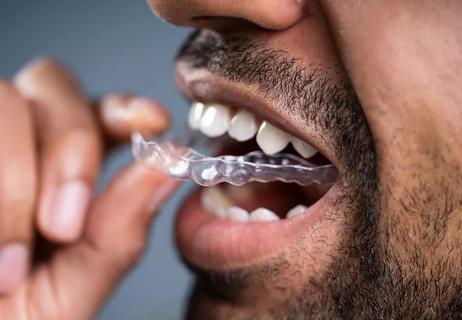The soreness could be from the way you sleep, teeth grinding, bite misalignment or other issues

Waking up with a sore jaw on one side is no way to start your day. The throbbing. The agony when you try to open your mouth. That disconcerting feeling that things just aren’t where they’re supposed to be.
Advertisement
Cleveland Clinic is a non-profit academic medical center. Advertising on our site helps support our mission. We do not endorse non-Cleveland Clinic products or services. Policy
Why does it happen? And what can you do about it? Dentist Karyn Kahn, DDS, shares some of the most common reasons you wake up with a sore jaw and what can help.
One-sided jaw pain in the morning is most often linked to things like grinding, clenching, a misaligned bite and your sleep position.
These factors and others can strain your jaw and lead to TMJ disorders, which cause pain and tenderness in your jaw. Not just at night, but all the time. Those troubles become most noticeable after a night of rest, leading to that Oh, my aching jaw feeling.
Dr. Kahn shares some specific reasons why you woke up feeling like you got punched in the face last night.
We all have a favorite way to curl up in bed. But some sleep positions can put a lot of strain on your body, including your jaw.
“When you sleep on your stomach, your head can’t rest properly on the pillow and in line with your cervical spine. Your head may be rotated or tilted. One shoulder goes up, and one shoulder goes down,” Dr. Kahn explains. “That can result in ‘myofascial pain with referral’ that you can feel in your jaw and the temporal mandibular joints (TMJ), the joints that rotate your lower jaw.”
Even if you stay off your stomach, think about where your hands are at night. If you’re resting your palm or a fist between your jaw and your pillow, you’re setting the stage for morning jaw pain.
Advertisement
“If you use your hand to support your head, you put tension on your jaw and push it to the opposite side,” she adds.
If you grind your teeth at night, you’re far from alone. Researchers say more than 8% of people regularly grind their teeth at night (or participate in sleep bruxism in scientific terms).
Your body needs rest, and that includes your jaw muscles. When your jaw is clenched overnight, it can lead to muscle and TMJ pain in the morning.
Stress is often blamed for causing grinding, but that’s not the whole story.
“Grinding and clenching come from your central nervous system — impulses from your brain,” Dr. Kahn shares. “It can be triggered by things like stress and anxiety, but also by certain medications. And it runs in families, too.”
Your teeth are designed to distribute force evenly in the front and back. If your teeth don’t fit together just right (either due to biology or trauma), dentists call that malocclusion, and it can cause TMJ dysfunction in some people.
“For example, a bite condition that only touches in the back during jaw closure is one example,” Dr. Kahn says. “That means they put extra force in the back of their mouth, which can generate greater muscle pain and overload the joints.”
What’s more, if you’re missing any teeth, it can change how you chew. It throws off the delicate balance of pressure within your jaw, leading to — you guessed it — jaw pain.
Things like chewing gum or ice can put extra strain on your jaw.
“Gum chewing uses a side-to-side muscle movement. That muscle is attached to the TMJ joint and the TMJ disk. Over time, excessive gum chewing may cause a TMJ disc displacement,” Dr. Kahn reports.
Of course, you’re (hopefully!) not chewing gum or chomping ice in your sleep. But similar to when you overexert muscles during exercise, overworking your jaw can take its toll while you’re sleeping, so you wake up feeling the effects.
Injuries or infections in your teeth can be felt as jaw pain as well. And it may be more obvious when you first wake up.
“If you have necrotic (dead or dying) tissue in your teeth or a tooth infection, it can feel worse when you lie down,” Dr. Kahn says. “Painful, traumatized teeth can put extra pressure on your jaw at night, especially if you’re also grinding or clenching.”
It’s not the most common reason, but jaw pain can sometimes be a sign of a heart issue, like angina (chest pain). It could even signal a heart attack.
Advertisement
“There’s a referral pattern from the heart to the jaw,” Dr. Kahn confirms. “Pain that originates in the heart and chest can sometimes be felt in your jaw.”
How do you know if your jaw pain is heart-related? It may be more likely if:
If you’re concerned that your jaw pain may be a sign of a heart attack, seek emergency medical care by dialing 911 or the emergency number in your country.
If you keep waking up with a pain in your jaw, your first step should be seeing a dentist, Dr. Kahn advises. They can check your bite alignment and inspect your teeth for clues to find the source of the pain.
Based on the cause of your pain, there are a few things that may help relieve jaw pain:
Advertisement
Here’s to pain-free mornings to come!
Advertisement

Sign up for our Health Essentials emails for expert guidance on nutrition, fitness, sleep, skin care and more.
Learn more about our editorial process.
Advertisement

You might think it’s fine, but your teeth and jaw beg to differ

If you have discomfort and pain in your face, it could mean something serious is going on

An expert gives us the details

Daily oral hygiene goes a long way to keeping your mouth healthy and your smile bright

Most kids start losing baby teeth around age 6 — but there’s some wiggle room in the timeline

Start weaning your toddler off daytime pacifier use by 12 months old to help prevent dental issues and speech delays

This oral health practice doesn’t have proven benefits, and it’s not a substitute for brushing and flossing

Take a hands-on approach to release tension and reduce pain in your jaw muscles

The tropical fruit is a good source of antioxidants and vitamin C

Most people fall asleep within 10 to 20 minutes, but if your experience is different, adjusting your sleep schedule may help

Exploring your hidden side can lead to better understanding of what makes you tick